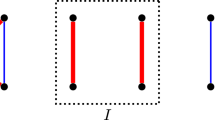Abstract
In this paper, we consider the problem of computing the rank of a block-structured symbolic matrix (a generic partitioned matrix) \(A = (A_{\alpha \beta }x_{\alpha \beta })\), where \(A_{\alpha \beta }\) is a \(2 \times 2\) matrix over a field \(\mathbf {F}\) and \(x_{\alpha \beta }\) is an indeterminate for \(\alpha = 1,2,\dots , \mu \) and \(\beta = 1,2, \dots , \nu \). This problem can be viewed as an algebraic generalization of the bipartite matching problem and was considered by Iwata and Murota (SIAM J Matrix Anal Appl 16(3):719–734, 1995). Recent interests in this problem lie in the connection with non-commutative Edmonds’ problem by Ivanyos et al. (Comput Complex 27:561–593, 2018) and Garg et al. (Found. Comput. Math. 20:223–290, 2020), where a result by Iwata and Murota implicitly states that the rank and non-commutative rank (nc-rank) are the same for this class of symbolic matrices. The main result of this paper is a simple and combinatorial \(O((\mu \nu )^2 \min \{ \mu , \nu \})\)-time algorithm for computing the symbolic rank of a \((2 \times 2)\)-type generic partitioned matrix of size \(2\mu \times 2\nu \). Our algorithm is inspired by the Wong sequence algorithm by Ivanyos et al. for the nc-rank of a general symbolic matrix, and requires no blow-up operation, no field extension, and no additional care for bounding the bit-size. Moreover it naturally provides a maximum rank completion of A for an arbitrary field \(\mathbf {F}\).





Similar content being viewed by others
References
Buss, J.F., Frandsen, G.S., Shallit, J.O.: The computational complexity of some problems of linear algebra. J. Comput. Syst. Sci. 58, 572–596 (1999)
Edmonds, J.: Systems of distinct representatives and linear algebra. J. Res. Natl. Bur. Stand. 71B(4), 241–245 (1967)
Fortin, M., Reutenauer, C.: Commutative/noncommutative rank of linear matrices and subspaces of matrices of low rank. Sémin. Lothar. Comb. 52, B52f (2004)
Fujishige, S., Király, T., Makino, K., Takazawa, K., Tanigawa, S.: Minimizing submodular functions on diamonds via generalized fractional matroid matchings. EGRES Technical Reports, TR-2014-14, (2014)
Garg, A., Gurvits, L., Oliveira, R., Wigderson, A.: Operator scaling: theory and applications. Found. Comput. Math. 20, 223–290 (2020)
Hamada, M., Hirai, H.: Maximum vanishing subspace problem, CAT(0)-space relaxation, and block-triangularization of partitioned matrix. arXiv:1705.02060 (2017)
Hamada, M., Hirai, H.: Computing the nc-rank via discrete convex optimization on CAT(0) spaces. SIAM J. Appl. Geom. Algebra (to appear)
Hirai, H.: Computing the degree of determinants via discrete convex optimization on Euclidean buildings. SIAM J. Appl. Geom. Algebra 3(3), 523–557 (2019)
Ishikawa, T.: Max-rank matrix completion via Wong sequence. Bachelor thesis, The University of Tokyo (2018) (in Japanese)
Ito, H., Iwata, S., Murota, K.: Block-triangularizations of partitioned matrices under similarity/equivalence transformations. SIAM J. Matrix Anal. Appl. 15(4), 1226–1255 (1994)
Ivanyos, G., Karpinski, M., Qiao, Y., Santha, M.: Generalized Wong sequences and their applications to Edmonds’ problems. J. Comput. Syst. Sci. 81, 1373–1386 (2015)
Ivanyos, G., Qiao, Y., Subrahmanyam, K.V.: Non-commutative Edmonds’ problem and matrix semi-invariants. Comput. Complex. 26, 717–763 (2017)
Ivanyos, G., Qiao, Y., Subrahmanyam, K.V.: Constructive non-commutative rank computation is in deterministic polynomial time. Comput. Complex. 27, 561–593 (2018)
Iwata, S., Murota, K.: A minimax theorem and a Dulmage–Mendelsohn type decomposition for a class of generic partitioned matrices. SIAM J. Matrix Anal. Appl. 16(3), 719–734 (1995)
Kabanets, V., Impagliazzo, R.: Derandomizing polynomial identity tests means proving circuit lower bounds. Comput. Complex. 13, 1–46 (2004)
Kuivinen, F.: On the complexity of submodular function minimisation on diamonds. Discrete Optim. 8, 459–477 (2011)
Lovász, L.: On determinants, matchings, and random algorithms. In: International Symposium on Fundamentals of Computation Theory (FCT’79) (1979)
Lovász, L.: Singular spaces of matrices and their application in combinatorics. Bol. Soc. Bras. Mat. 20(1), 87–99 (1989)
Oki, T.: On solving (non)commutative weighted Edmonds’ problem. In: Proceedings of the 47th International Colloquium on Automata, Languages and Programming (ICALP’20), Leibniz International Proceedings in Informatics (LIPIcs), vol. 168, pp. 89:1–89:14 (2020)
Schwartz, J.T.: Fast probabilistic algorithms for verification of polynomial identities. J. ACM 27(4), 701–717 (1980)
Tutte, W.T.: The factorization of linear graphs. J. Lond. Math. Soc. 22(2), 107–111 (1947)
Acknowledgements
We thank the anonymous reviewers of for their helpful comments. The authors were supported by JSPS KAKENHI Grant Number JP17K00029. The first author was supported by JST PRESTO Grant Number JPMJPR192A, Japan. The second author was supported by JSPS KAKENHI Grant Numbers JP19J01302, 20K23323, 20H05795, Japan.
Author information
Authors and Affiliations
Corresponding author
Additional information
Publisher's Note
Springer Nature remains neutral with regard to jurisdictional claims in published maps and institutional affiliations.
A preliminary version of this paper has appeared in the proceedings of the 21st Conference on Integer Programming and Combinatorial Optimization (IPCO 2020). This work was done while Yuni Iwamasa was at National Institute of Informatics.
Rights and permissions
About this article
Cite this article
Hirai, H., Iwamasa, Y. A combinatorial algorithm for computing the rank of a generic partitioned matrix with \(2 \times 2\) submatrices. Math. Program. 195, 1–37 (2022). https://doi.org/10.1007/s10107-021-01676-5
Received:
Accepted:
Published:
Issue Date:
DOI: https://doi.org/10.1007/s10107-021-01676-5




